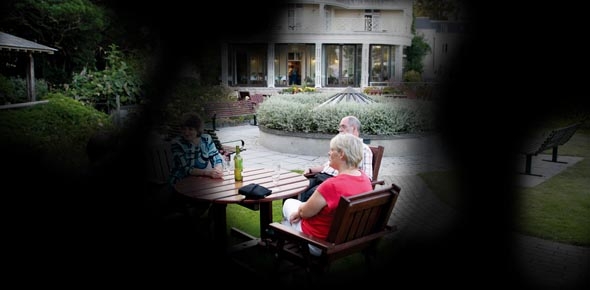What is retinitis pigmentosa?
The retina is the light sensitive tissue lining the back of the eye. Retinitis means disease or inflammation of the retina. Pigmentosa refers to how the retina appears in this condition, as the retina can have dark spots of pigment. The parts of the retina affected can be the rod or cone receptors, these sometimes are affected from birth or slowly stop over time. Sight loss is gradual but progressive. It is unusual for people with retinitis pigmentosa to become completely blind.

What are the Symptoms of retinitis pigmentosa?
There might be some difficulty seeing in low light such as outdoors at dusk or in a dimly lit room. The visual field is also reduced and sight loss can be from above and below. This is often referred to as tunnel vision it means that the rod cells and some of the outer cone cells have been affected first. In some Retinitis Pigmentosa related conditions central vision is lost first and the person affected can have difficulty reading print or doing detailed work. In many types of Retinitis Pigmentosa the glare from bright lights can cause a problem although some people do not suffer from this until the condition has developed.
Young children
Parents may notice the following signs in their children and that their vision has reduced.
Eyes moving to and fro – this is known as Nystagmus
Touching their eyes
Roving eye movement
An optician can check how their eyes react to bright light. Some children may have other symptoms of Retinitis Pigmentosa which do not relate to their vision it may only be later that vision is affected. Other symptoms of Retinitis Pigmentosa are conditions such as low hearing, learning difficulties and reduced growth.
What are the causes of retinitis pigmentosa?
Retinitis pigmentosa is caused by genetics. A person with Retinitis Pigmentosa has often inherited a gene from one or both of their parents, although the condition can often skip generations.
Retinitis Pigmentosa occurs because the retina cannot respond to light properly. The problem can be in many parts of the retina such as the rod or cone cells or in the connections between the cells of the retina. In most cases the early symptoms of Retinitis Pigmentosa develop between the ages of 10 and 30.
What should I do?
Retinitis Pigmentosa is best detected by an examination of the inside of the eye using a opthalmoscope by a doctor.
A normal eye test may not detect peripheral and side vision loss. There are other tests which measure the area of visual field and the ability to adapt to low lights.
Can it be treated?
There is no treatment available to cure or prevent the progression of Retinitis Pigmentosa.
Living with it and how will I cope?
There are low vision devices which can help magnify, reduce glare and illuminate objects at home and in work. Children can wear spectacles to help the vision parts of the brain develop correctly. There are many practical changes that can be made to help.
Is there a cure?
Scientists are researching treatments such as retinal implants and drug treatments.
Other related conditions
People with Retinitis Pigmentosa often develop cataracts. These can be operated on once they reach a certain stage. The lens can be replaced or glasses prescribed. Depending on the condition of the retina a certain amount of vision might be restored after the operation.
Usher Syndrome
People with Retinitis Pigmentosa can also inherit another condition called Usher Syndrome, which is when people develop hearing loss. For more information on Usher Syndrome please contact SENSE.
Other Types of Retinitis Pigmentosa
Some of the other types of Retinitis Pigmentosa are rod-cone dystrophy, Leber’s Amaurosis and Batten’s Disease.
Further information
This document was created in partnership with RNIB and Action for the Blind.
We are a local charity providing practical help and advice to people affected by sight loss, to maximise independence, wellbeing and choice.
You can call the RNIB Helpline on 0303 123 9999 and coordinators will provide you with impartial support and advice on everything to do with visual impairment.
RNIB have information on eye conditions from the Royal College of Ophthalmologists.
British Retinitis Pigmentosa Society are a charity supporting people with Retinitis Pigmentosa. They organise support groups you can join which are nationwide.
Disclaimer
Devon in Sight is not a medical organisation, therefore we can only provide general information that is not intended to be a substitute for a proper medical assessment. The information is also not intended to be used for individual cases. If you have a specific question about your eye condition, we recommend that you consult an eye care professional.
Devon in Sight has tried to ensure that the contents of these pages are accurate. However Devon in Sight will not accept liability for any loss or damage or inconvenience arising as a consequence of any use of or the inability to use any information on our website or in these fact sheets.
Visitors who use our website and use these factsheets and rely on any information do so at their own risk. Devon in Sight does not represent or warrant that the information accessible via the website or these fact sheets is accurate, complete or up to date.
The information contained on the website or these factsheets was correct at the time of writing. However, due to research and medical advances, the content may not be completely up to date.

